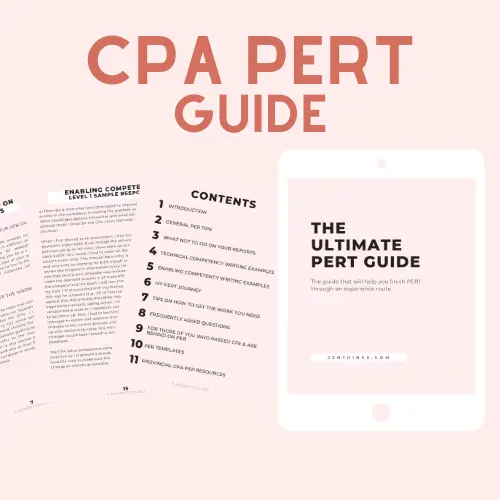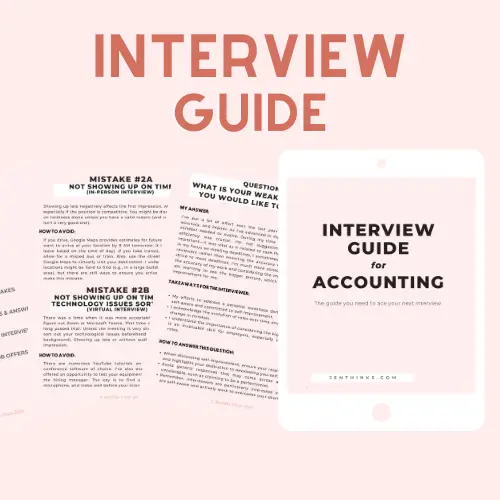This post will walk you through the steps of what to do when you start a new job under the Experience Verification Route (EVR) for CPA PERT. If you haven’t read it already, I wrote an ultimate guide for CPA PERT before. I thought I got CPA PERT sort of figured out until I changed job last month. I was completely distracted by the shiny new object aka the job so I neglected to figure out what I had to do for CPA PERT for the job change (I knew I had to do something). I wanted to blame the Finance module too but the reality is I am taking the extended pace. There was a lot of Netflix when I could have been catching up on PERT instead…
RELATED POST – CPA PEP – Regular Module or Extended Module?
Also, like all many things with PERT, it took a little bit of Googling before I found the right answer applicable to my provincial body (CPABC). My suggestion would be to Google “(your CPA provincial body) PER job change EVR.” For example, I googled bccpa per job change evr and found this useful guide created by CPABC.
Read all CPA PERT posts here.
Before Your Last Day At Your Old Job
Complete A Current Experience Report
If you don’t want to miss any duration credit like I did, make sure you complete a Current Experience Report for the period ending on the last day at you old job. This involves giving your manager a heads up and potentially getting contact information from him/her so you can reach out after. Since you won’t be able to submit the report until after your last day, you might have to reach out to your manager to remind him/her after.
I also suggest filling out the technical and enabling competencies at least one week before your last day of work. This is because depending on whether you have time off before your next job, you will most like be busy and tired from training all day to have any energy left over to work on PERT.
Once your Current Experience Report is ready for submission, make sure you select “Change of Job Assessment” as the reason.
Schedule A Meeting With Your Mentor
Unless you happen to have met your CPA mentor recently, otherwise you need to schedule a meeting with your mentor close to or on the last date of your employment.
Keep in mind that if your current CPA mentor is either your manager at your old job or works at the same company as you, this job change might indicate a need to get a new CPA mentor. You might not want this but it is important to double check with your CPA mentor for their preferences.
Shortly After You Start Your New Job
Submit A Blank EVR Report for Pre-assessment
When your last Current Experience Report is reviewed by CPA, your reporting status will be changed to “Unemployed.” Once that is reflected on your PERT profile, you need to submit a blank experience report with a copy of your job description on your company’s letterhead. Some companies include that in your offer letter and if they don’t, reach out to your HR department for a copy. Note, do not enter any technical or enabling competencies on this report. You will need your new supervisor’s approval before you can request for CPA review. This time, select “Pre-assessment” as the reason.
If you recall doing this when you first started with CPA PERT, you will be familiar with this step already. This is required for any change of job with a new company (i.e., promotion within the same company does not require an pre-assessment).
Once CPA has approved your new job description, your reporting status will be changed back to “Experience Verification.”
RELATED POST – CPA PERT – Technical Competencies Examples
Start Reporting On What You Have Done On Day 1
Even though you will not be submitting your first report until you have been there for at least three months, I suggest you start filling out technical and/or enabling competencies right away. I have found this way to be the easiest because I can recall the details of the task much easier than if I had waited six months.
Also, frequent reporting will allow you to identify tasks required to reach Level 2 early. This way, you can discuss with your manager with ample of time for you and him/her to come up with an action plan. For example, if you require budgeting experience under Management Accounting, the best time for exposure will be towards fiscal year end when the annual budgeting takes place.
Are you looking for a comprehensive guide for PERT with example Level 1 & 2 full responses, tips, templates and more? Check out my CPA PERT Guides!
Find A New CPA Mentor (If Applicable)
In the previous section, I mentioned the importance of double checking with your existing CPA mentor whether the mentoring relationship should continue. If the outcome is that you need a new CPA mentor, make sure you find one before submitting your next Current Experience Report 3 to 6 months from your first day at your new job. If you need help, CPA Canada has an useful guide on how to find a CPA mentor that you can check out here.
Six Months After You Start Your New Job
Submit A Current Experience Report
Even though you are allowed to submit an experience report with only three months on the job, my suggestion is to wait until you have six months worth of experience. This is because frequent and brief reports require your manager and mentor to review and approve more often (twice a year versus four times a year). Since CPA requires you to meet with your CPA mentor semi-annually, it will probably be easiest to synchronize both the review and meeting.
Conclusion
Starting a new job is exciting but can also be overwhelming. I hope this post helps you with what to do with CPA PERT so it is one less thing for you to worry about.



